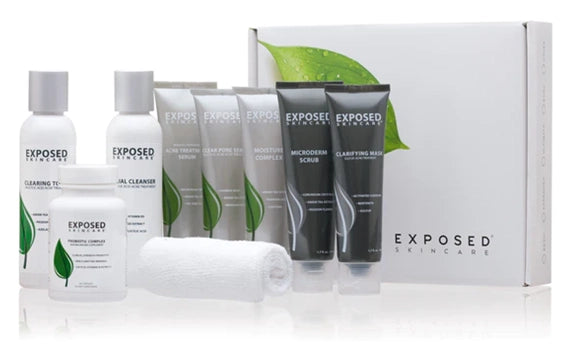
Many factors contribute to acne. One that you might not have considered is the length and style of your hair. Does long hair cause acne? It’s a question that piques the curiosity of many, especially those who proudly sport long, luscious locks.
This comprehensive guide will dive into the nitty-gritty details of how your hair might affect your skin and the types of forehead acne you might be prone to. Continue reading to learn whether your long hair is worth its price.
Also read: How to choose the best acne treatment
Biggest Take-Aways:
- Long hair can contribute to acne but is not the sole culprit. It can trap oil, dirt, and sweat against the skin, leading to acne.
- Preventative measures like keeping your hair clean, tying it back, and using non-irritating hair products can minimize acne risks.
- Acne is a multifaceted issue that can be affected by various factors, including hormones, diet, and skincare routines.
- Exposed Skin Care offers a holistic approach to acne treatment, blending scientific and natural ingredients to manage various forms of acne effectively.

Hair and Its Connection to Skin Health
Your hair and skin are more closely related than you may think. Both are affected by the natural oils your body produces, known as sebum. Sebum is essential for moisturizing your skin and hair, but in excess, it can lead to various issues like oily scalp and skin and yes, acne.
Types of Forehead Acne Associated with Long Hair
If you have long hair, you might have noticed different types of forehead acne cropping up now and then. This is no coincidence. Long hair can lead to:
- Whiteheads: Small, round acne filled with pus.
- Blackheads: Open pores filled with sebum and dirt.
- Papules: Small red bumps.
- Pustules: Similar to papules but filled with pus.
The proximity of long hair to your forehead means there is a greater chance of pore-clogging oils and bacteria coming into contact with your skin.
Can Long Hair Cause Acne?
Long hair naturally collects more oil, dirt, and product residue than shorter styles. It is also more likely to contact your face, especially your forehead. This frequent contact can cause acne breakouts, specifically on your forehead. But is your long hair solely to blame?
What Causes Acne?
It’s crucial to remember that while your long hair could be a contributing factor, it is usually not the sole cause of acne. Other factors that could be causing your acne include:
- Hormonal Changes: Particularly in adolescence and for women during their menstrual cycle.
- Stress: This can lead to increased sebum production.

- Poor Hygiene: Failing to wash your face and hair regularly can cause breakouts.
Xem thêm : Understanding Swim Shirts vs Rash Guards vs Sun Shirts
If you suspect your long locks are causing your acne, here’s a way to test the theory. Try securing your hair away from your face for an extended period. If you notice a reduction in acne, especially the types of forehead acne we discussed earlier, your hair could be a contributing factor.
Taking Preventive Measures
Hair Care and Skincare Routine
The products you’re using for your hair and skin can significantly impact you. Here’s what you should look out for:
- Shampoo and Conditioner: Use non-comedogenic products, meaning they won’t clog pores.
- Facial Cleansers: Opt for a mild face wash to prevent irritating your skin further.
When and How to Wash Your Hair
Washing your hair too frequently can strip it of its natural oils, while not washing it enough can cause oil and dirt buildup. Experts recommend washing long hair every 2-3 days to maintain a healthy balance.
Securing Your Hair Properly
- Loose Ponytails: This will prevent hair from contacting your face.

- Use Clips or Bobby Pins: Keep bangs or loose strands away from your forehead.
- Wear Hats Carefully: Hats can also cause forehead acne, so be selective and clean them regularly.
How to Sleep to Avoid Acne
Your sleeping position and conditions can also affect your skin health:
- Change Pillowcases Regularly: This minimizes the transfer of oils and dirt to your face.
- Sleep with Hair Tied Back: This trick keeps hair away from your face.
- Use Clean and Soft Fabrics: Applicable to both your bedding and nightwear.
Everyday Tips to Keep Acne at Bay
Here are some general guidelines to help prevent acne:
- Be Cautious of the Products You’re Using: Hair and skincare products can have ingredients that cause breakouts.
- Maintain a Clean Environment: This includes your bed, hats, and anything else that comes in contact with your skin.
- Avoid Touching Your Face: Especially with dirty hands.
- Exercise Regularly but Wisely: Sweat can contribute to acne, so wash your face after workouts.
- Stay Hydrated: This helps in maintaining the balance of natural oils.
Why Exposed Skin Care is a Game-Changer in Managing Acne
While many hair products and treatments claim to manage acne, few are as comprehensive and effective as the Exposed Skin Care range.

Here’s why it stands out:
- Comprehensive Treatment: With a wide array of products, from cream to gel, Exposed Skin Care offers a holistic approach to tackling pesky pimples, whether on your hairline or elsewhere.
- All Ages: Acne doesn’t discriminate by age. That’s why Exposed Skin Care has formulations suitable for various age groups. It tackles acne triggers effectively, regardless of when they hit you.
- Quick and Easy: In a rush? Just take a quick rinse with the Facial Cleanser to remove dirt and impurities without causing any imbalance in your skin’s natural oils.
- Safe for Everyday Use: You don’t have to skip days worrying about harsh ingredients. Exposed Skin Care is gentle enough to be used daily without worsening acne.
- Doesn’t Lead to Acne: Are you concerned that using hair and skincare products will lead to more acne? With Exposed Skin Care, that’s not a concern. Its non-comedogenic formula ensures that it won’t clog pores or cause pimples.
Remember that managing acne doesn’t depend solely on avoiding certain hair products. Effective treatment is key, and Exposed Skin Care offers that reliability.
Conclusion
Xem thêm : The Esthetician’s Guide to Skincare Mixology
While it’s tempting to blame your locks for those pesky pimples solely, remember that multiple factors often contribute. Understanding these variables can help determine the most effective course of action for you, whether it’s changing your hair care routine or opting for different skincare products.
As for the direct impact of long hair on acne, taking preventive measures such as tying your hair back, especially in the sun, and being selective about your products can go a long way. If you don’t see immediate results, don’t be disheartened; skin health is a long-term commitment that requires regular care and attention.
There’s no one-size-fits-all solution for acne. What works for one person may not work for another, making it essential to consider a multifaceted approach. This includes focusing on the hair and paying close attention to the products you rub onto your skin.
This is where Exposed Skin Care can be particularly helpful. It offers a broad range of products designed to tackle various forms of acne, effectively eliminating those stubborn skin issues.
So, if you’ve tried various treatments and have been hesitant to experiment further, maybe it’s time to stop using products that merely claim to help and opt for something proven like Exposed Skin Care. With the right approach and the right products, clearer skin could be just around the corner.
FAQs
Does long hair cause acne?
While long hair doesn’t directly cause acne, it can contribute to conditions that make acne more likely, such as trapping oil, dirt, and sweat against the skin.
What can I do to prevent acne if I have long hair?
Keeping your hair clean, tying it back, especially in hot conditions or while exercising, and avoiding hair care products that irritate your skin can help in prevention.
Is acne caused only by hair care products?
No, acne can be triggered by various factors, including hormones, diet, stress, and poor skincare habits.
Can the sun worsen my acne?
Excessive sun exposure can irritate the skin and exacerbate existing acne conditions.
How can Exposed Skin Care help in treating acne?
Exposed Skin Care offers a comprehensive range of products suitable for daily use and formulated with both scientific and natural ingredients to effectively tackle various forms of acne.
Nguồn: https://buycookiesonline.eu
Danh mục: Info









